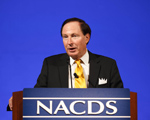Getting patients to stick to their meds is a common refrain in pharma, as companies experiment with ways to keep refills--and sales--coming. But drug adherence also plays a role for payers, new research shows. Medicaid patients who kept taking their prescription drugs saved the program money, a study found.
Researchers at industry groups including PhRMA and the National Association of Chain Drug Stores (NACDS) sifted through data on more than 1.5 million Medicaid enrollees with a variety of chronic diseases and conditions, and saw that a 1% increase in overall prescription drug use by adults and children was linked to decreases in non-drug costs, Drug Store News reports.
The data piggybacks on an estimate by the Congressional Budget Office, which found that a 1% hop in patient adherence translated into decreases in medical spending.
 |
| NACDS CEO Steve Anderson |
"This research is further evidence of the impact of taking medications as prescribed--both in helping patients manage their chronic conditions and reducing emergency or catastrophic medical costs associated with medication non-adherence," said Steve Anderson, president and CEO of NACDS (as quoted by Drug Store News).
But Medicaid patients could have some trouble accessing their meds as the price of new therapies continues to skyrocket. Lawmakers and the public are pushing back at Medicaid and Medicare drug-spending hikes, with many pointing fingers at pricey new banded drugs, including Gilead's ($GILD) $84,000-per-treatment hep C powerhouse Sovaldi, and the rising costs of generic meds. And some don't see the problem going away anytime soon.
"Total costs will go up," Matt Salo, executive director of the National Association of Medicaid Directors, said earlier this year about Sovaldi. "While we're fortunate that the price per pill has come down from $1,000, it's still too high to provide complete access for the millions of infected patients in this country."
- read the Drug Store News story